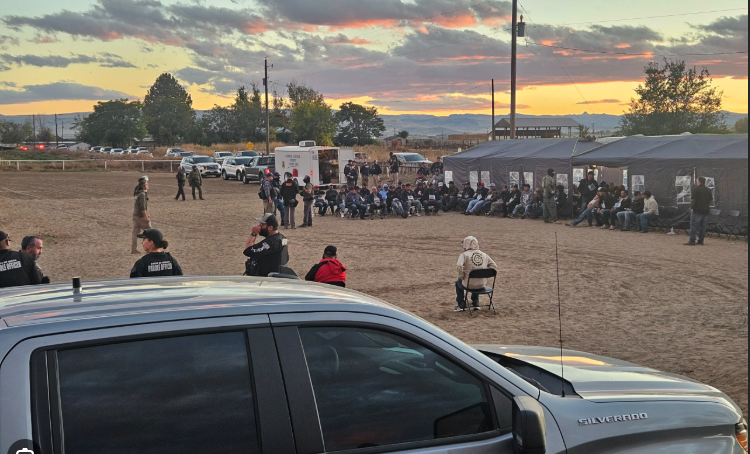The Wilder, Idaho Immigration Raid 10/19/2025
On Oct. 19, 2025, the FBI, with ICE support, raided a horse arena in Wilder, ID, targeting an illegal gambling ring. While 5 people were arrested on gambling charges, ICE detained 105 individuals for immigration violations, sparking controversy over "military-style" tactics.

The Wilder, Idaho Immigration Raid
On October 19, in the small rural town of Wilder, Idaho—home to fewer than 2,000 residents, predominantly Hispanic—approximately 200 law enforcement officers from 10 different agencies, including the FBI and Department of Homeland Security, conducted a large-scale raid during a public fall festival. The stated justification was an FBI tip regarding possible illegal gambling related to horse racing.
During the operation, between 400 and 500 festival attendees were temporarily detained, including children, many of whom were zip-tied and separated from their parents. Despite the scope of the raid, only five adult men were charged with gambling-related offenses. In contrast, 105 individuals were detained by immigration authorities, most of whom were not connected to the FBI’s investigation and were reportedly U.S. citizens or legal residents.
Notably, Wilder is located approximately 472 miles from the Pacific Ocean, placing it outside the 100-mile border enforcement zone where DHS has expanded authority. This raises constitutional concerns regarding Fourth and Fourteenth Amendment protections, particularly around probable cause, racial profiling, and blanket detention practices.
🏛️ Policy Ethics Report
Title: Ethical Analysis of the Wilder, Idaho Immigration Raid
Date of Event: October 19
Location: Wilder, Idaho (Population ~2,000, predominantly Hispanic)
I. KEY ELEMENTS
📌 Key Actors:
- Department of Homeland Security (DHS)
- FBI (initial gambling tip)
- Immigration and Customs Enforcement (ICE)
- Local and state police (10 agencies total)
- ACLU of Idaho
- Residents of Wilder, Idaho
- Detained individuals (many U.S. citizens/legal residents)
⚖️ Core Decisions:
- Deployment of 200 officers, drones, and helicopter at a peaceful festival
- Detention of 105 people, many zip-tied or separated from children
- Only 5 individuals charged (gambling-related)
- Event took place far outside DHS “100-mile border zone”
🚨 Issues Identified:
- Mass detentions without individualized suspicion
- Racial profiling indicators
- Violation of Fourth and Fourteenth Amendments
- Misuse of federal enforcement resources
- Psychological and social harm inflicted on a peaceful community
II. ETHICAL FRAMEWORK ANALYSIS
1. John Adams’ Moral Algorithm
- ❌ Fails the Common Good — Undermines trust and harms peaceful citizens
- ❌ Fails Avoidance of Private Interest — Bureaucratic overreach; possibly racialized enforcement
- ❌ Fails to Reform Injustice — Instead imposes injustice on innocents
2. John Rawls’ Veil of Ignorance
- ❌ Fails Rational Justifiability — No one would design such a system behind the veil
- ❌ Fails Equality of Rights — Targets lawful people based on ethnicity
- ❌ Fails Protection of the Least Advantaged — Harms the structurally marginalized
3. Aristotle’s Virtue Ethics
- ❌ Fails Justice — Disproportionate, indiscriminate, and fear-based
- ❌ Fails Moderation and Wisdom — Force over prudence; spectacle over justice
- ❌ Fails Eudaimonia — Destroys rather than nurtures community flourishing
III. ECONOMIC JUSTICE LENSES
💵 Chartalism / MMT
Public monetary resources were used to undermine the public, not serve it. Misallocation of state authority.
📈 Cantillon Effect
Those at the center of power (federal law enforcement) enacted disruptive actions with impunity, while the economic and psychological burdens were offloaded onto a rural, working-class, predominantly minority population—clear Cantillon distortion.
✅ ETHICAL PASS/FAIL SUMMARY
| Framework | Pass/Fail |
|---|---|
| John Adams’ Moral Algorithm | ❌ Fail |
| Rawls’ Veil of Ignorance | ❌ Fail |
| Aristotle’s Virtue Ethics | ❌ Fail |
| Chartalism/MMT | ❌ Fail |
| Cantillon Effect | ❌ Fail |
IV. MONOLOGUE SUMMARY – Formal Policy Ethics Assessment
Ladies and gentlemen, what occurred in Wilder, Idaho on October 19th is not just a localized enforcement operation — it is a national test of our constitutional and moral integrity.
In a peaceful, majority-Hispanic rural town, 200 officers descended upon a family festival under the pretense of investigating gambling. In that moment, rights were suspended, children were zip-tied, and racial identity became a trigger for detainment.
Through the lens of John Adams, this raid is a failure of republican virtue — it serves neither the common good nor any legitimate reform. It is a stain on the civic fabric.
Behind Rawls’ veil of ignorance, no rational person would design a society where they could be detained without cause simply for their skin color or for attending a community event. This raid makes a mockery of equal protection and fairness.
Through Aristotle’s ethics, we see a lack of moderation, a breach of justice, and an action that degrades rather than uplifts. It does not foster flourishing — it inflicts trauma.
Economically, the operation represents a maldistribution of public resources: federal power and money used not to protect, but to persecute, especially in ways consistent with Cantillon distortions — centralized authority exploiting peripheral communities.
If the ACLU proceeds with litigation, the case could eventually reshape civil liberties jurisprudence in the Ninth Circuit, and potentially in the Supreme Court. Until then, Wilder stands as a warning — of what happens when fear overrides law, and when citizenship is conditional on appearance.
This event is not just about immigration enforcement. It is about who gets to be protected by the Constitution — and who doesn’t.
Let us remember: the Constitution does not apply only in convenient locations or to convenient people. It applies to all.
